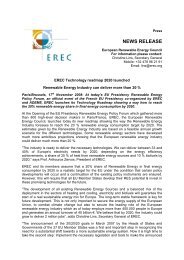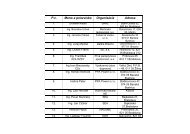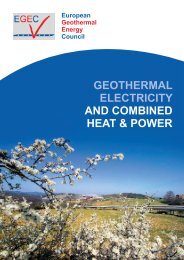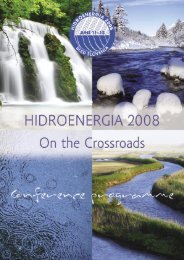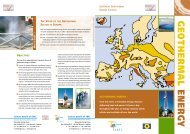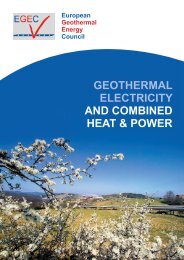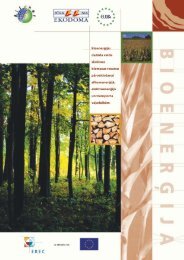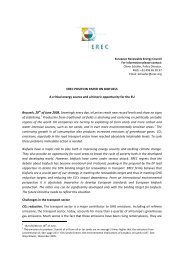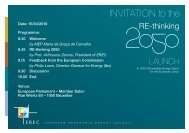CTO Assessment - European Commission
CTO Assessment - European Commission
CTO Assessment - European Commission
You also want an ePaper? Increase the reach of your titles
YUMPU automatically turns print PDFs into web optimized ePapers that Google loves.
EEKLO<br />
Sustainable<br />
Energy Project<br />
Contact: Mr. Karel Derveaux •Ecopower cvba<br />
Statiestraat 164 e, B-2600 Brecham-Antwerpen • Belgium<br />
Tel/Fax: 0032 3 287 37 79 •E-mail: karel.derveaux@ecopower.be<br />
Website: www.ecopower.be<br />
The Eeklo project was an outstanding success<br />
in that it gained huge support and<br />
attention for Wind Power and RES<br />
throughout Eeklo, regionally and also at<br />
an EU level mainly through the high level<br />
of community involvement. Although there<br />
were some obstacles the project was<br />
greatly facilitated by the fact that transportation<br />
of Green Electricity over the distribution<br />
net is free in Flanders. This cut<br />
approximately a third of conventional supply<br />
costs enabling Ecopower to sell electricity<br />
to its customers at a lower rate whilst<br />
losing no money themselves.<br />
Main aims and motivations To rapidly exploit<br />
the RES potential in the Flemish region<br />
of Belgium. To achieve close involvement<br />
and awareness at a community level.<br />
The project<br />
Ecopower (a financing co-operative for<br />
renewable energy) implemented a sustainable<br />
energy project in the small Flemish<br />
city of Eeklo. In 2001 the first two of three<br />
planned wind turbines started production.<br />
These are the largest wind turbines in Belgium,<br />
increasing the total installed capacity<br />
by over 20%. Also as part of the project<br />
there is a small hydro station.<br />
Overall Evaluation<br />
High acceptance for Wind Energy within<br />
the community of Eeklo.<br />
Increased awareness of sustainable energy<br />
issues.<br />
Generated tourism and interest from<br />
other localities and also at EU level.<br />
Innovative community involvement<br />
One of the aims of the Eeklo project was<br />
close community involvement and support<br />
for the project. This was mainly achieved<br />
by delivering direct benefits to the residents<br />
of Eeklo through selling them shares at<br />
250 Euro each and with 6% dividends. All<br />
shareholders have equal influence regardless<br />
of amount of shares they possess.<br />
Enabling factors<br />
The project received financial support from<br />
the Flemish regional authorities. A further<br />
enabling factor to the realization of the project<br />
was Market liberalization which facilitates<br />
the direct sale of electricity to private consumers.<br />
There was also legal support in that<br />
transportation of green electricity over the<br />
distribution net in Flanders is free, a major<br />
facilitating factor for Ecopower when deciding<br />
to become a supplier.<br />
Challenges<br />
The administrative processes for setting up<br />
a project like this are long and slow. One<br />
complaint can halt a wind turbine being installed<br />
even if the majority of the residents<br />
are in favour of it. This happened in Eeklo<br />
at one of the three planned sites and is the<br />
reason why the overall wind energy target<br />
has not been reached.<br />
It was also necessary to combat the preconceptions<br />
of the local governments who<br />
were skeptical about the installation of wind<br />
turbines. This was achieved by providing<br />
them with all the facts and the predicted<br />
benefits. The overwhelming community<br />
support and financial success of this project<br />
may help to strengthen political enthusiasm<br />
for future projects of this kind.<br />
Objective Result Comment<br />
Replication Potential:<br />
EEKLO project is a replication of many others<br />
of its kind in Germany and Denmark.<br />
Involving the community was what made<br />
the project so widely accepted and supported<br />
both financially and through community<br />
participation. This is something<br />
that can be done in any local area provided<br />
that the local council is interested.<br />
The success due to the law in Flanders,<br />
that specifies that transportation of Green<br />
Electricity over the low-voltage distribution<br />
net is free of charge, should serve as<br />
an example to other regional governments.<br />
RES development would be given the boost<br />
it needs.<br />
Two other co-operatives want to do similar<br />
things in Flanders and there is also<br />
some activity in Wallonia.<br />
Implementation of the RES projects<br />
(1999 – 2003)<br />
The public are willing to make more efforts<br />
to support RES developments but the<br />
problem is in raising their awareness of<br />
the issues. A concerted campaign operating<br />
on all levels; EU, national, regional and<br />
local is needed in order to achieve this.<br />
The results of the Eeklo project constitute<br />
a 30% rise in RES share on a local level.<br />
Wind Energy 15 MW 4.3 MW Delays in building permission<br />
(av 8,500,000 kWH/year)<br />
PV Systems not defined 10 kWp Co-ordinated private investors<br />
Micro-hydro 125 kW 100 kW Production levels doubled and<br />
cost halved due to local involvment<br />
Due to market liberalization<br />
Gain 1000 >2000 Ecopower is able to<br />
Shareholders<br />
Community<br />
sell electricity directly to private<br />
consumers<br />
4 long term jobs created<br />
48 <strong>CTO</strong> - Showcase


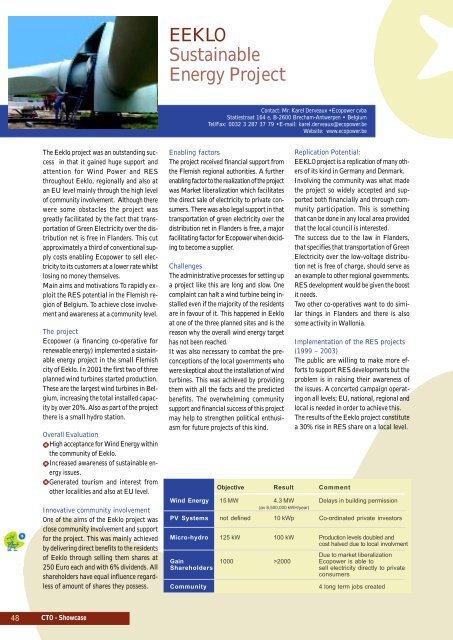
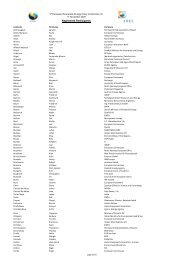
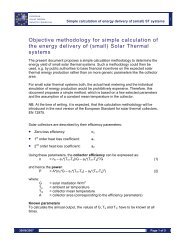
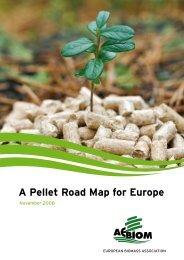
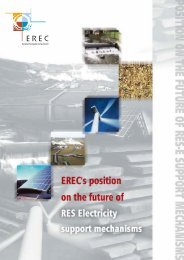
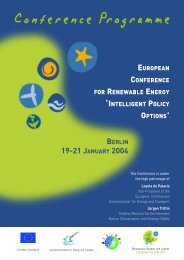
![Energy [R]evolution - Greenpeace](https://img.yumpu.com/47174859/1/184x260/energy-revolution-greenpeace.jpg?quality=85)
